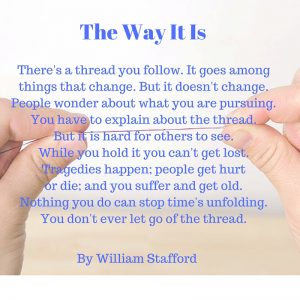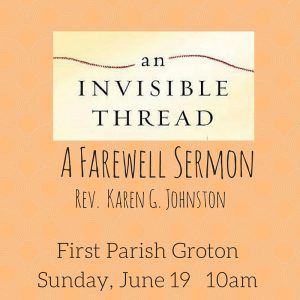Let us start with a poem
 We all have a thread that runs through our lives. Sometimes we know what it is. Sometimes we think we know what it is. Sometimes, as Elea recently preached, we make plans based on what we understand is our thread, our purpose, and then god laughs, and we adjust. Sometimes that adjustment is due to joy or a new insight; sometimes it is due to tragedy. Sometimes the adjustment is an easy one; sometimes it is one that takes all we have to give, and even a little more.
We all have a thread that runs through our lives. Sometimes we know what it is. Sometimes we think we know what it is. Sometimes, as Elea recently preached, we make plans based on what we understand is our thread, our purpose, and then god laughs, and we adjust. Sometimes that adjustment is due to joy or a new insight; sometimes it is due to tragedy. Sometimes the adjustment is an easy one; sometimes it is one that takes all we have to give, and even a little more.
Sometimes we lose track of the thread. Our sense of purpose, our ability to make meaning, is profoundly challenged. Loved ones stolen from us too soon. The pernicious influence of depression. Cruelty on top of cruelty can lead us to believe the thread is gone from us. Sometimes we think we’ve lost it because of our own impatience, our own sense of self has become too big or too small and we’ve lost our place in the wider universe, we’ve lost our sense that we are a child of the divine, not too big and not too small, but just right.
You, my beloveds, are just right. Just as you are. Your thread is there, even if you cannot see it or feel it, even if you have not yet known it.
~~~
Before Elea went on sabbatical, I watched her attempt to tie up all the loose ends, then to re-learn that it is impossible. There will always be loose ends. Good-byes I want to say in person will not get said. Thank you cards will go unwritten. I wish for no disappointment, no sense of neglect, no hurt, but I have lived long enough on this earth to know that things happen inadvertently. We try our best and still, sometimes, ends stay loose.
With that fully in mind, and in full possession of my capacity for irony, I intend right now to tie up some loose ends. By manner of which, I would like to take you through a short tour of some of the sermons I have preached here in these two years.
You might remember the Reverend Chris Antal, about whom I preached last November. Many of you were moved by the story of his service as a Unitarian Universalist military chaplain, one who had served in Afghanistan, a place sorely in need of our beacon of liberal religion. I want to update you that this past April – and you might know this already because there has been some national media attention to this — Chris resigned his commission as Captain in the army in protest of US policy on drones, decrying the death of too many innocent civilians. He continues to serve his congregation in Upstate New York and to be a prophetic voice within our faith movement.
You might remember that I asked you all to be “bus stop ministers,” asking you to create a safe world for all our children, especially our transgender and genderqueer children. I said this in reflection upon my own family:
In bringing to a close to that particular loose end — and you might have read about this in the June newsletter — my good-bye gift to the congregation is bathroom signs that clearly and explicitly and unapologetically state All Genders. It may seem unnecessar y to have such signs since we already have bathrooms that are unisex in function. However, I can assure you that like the rainbow flag in the window that faces Main Street, these signs will be a clarion of welcome and safety to the very people who need that message. I give this to you because I believe in your capacity to do this, even if it is confusing for some of you. I thank the Joint Board for their acceptance of this gift on your behalf.
y to have such signs since we already have bathrooms that are unisex in function. However, I can assure you that like the rainbow flag in the window that faces Main Street, these signs will be a clarion of welcome and safety to the very people who need that message. I give this to you because I believe in your capacity to do this, even if it is confusing for some of you. I thank the Joint Board for their acceptance of this gift on your behalf.
Last December I preached about how in the midst of hellish disasters, we humans build little heavens. History is replete with examples, but so is our current public life, given the Orlando tragedy. There are stories of long lines in the Florida heat so that people could donate blood. There is this story: the fast food restaurant, Chic-Fil-A, known for its assertively homophobic owner and corporate presence, as well as not being open on Sundays — staff in one of their Orlando restaurants opened up on Sunday, making food, and delivering it to first responders and blood donors. Or the story of Utah Lt. Governor, Spencer Cox, who has a public history of making homophobic remarks and taking anti-gay stands, just on Friday – two days ago – apologizing to the GLBTQ community, sharing that his heart has been transformed. We have the story of Imran Yousaf, former marine and bouncer at the night club Pulse, who acted decisively, saving 70 people, and then as he is interviewed, breaks down on camera because he didn’t save more.
These examples remind me of the story at the airport by Naomi Shihab Nye that both Elea and I have preached. It ends with these words:
And I looked around that gate of late and weary ones and I thought, This is the world I want to live in. The shared world. …. This can still happen anywhere. Not everything is lost.
In my first ever sermon at First Parish, and I don’t think you will be surprised, I spoke to the events in Ferguson, Missouri and the killing of Michael Brown, which had happened just two months previously. To do so, for the first time ever, I walked up these stairs of this strange high pulpit and said these words to you. They are as true now as they were then:
Thank you for this journey we have begun together, I as your intern minister and each of you as my teachers, my companions, my inspirations, and no doubt, my source of curiosity and delight. Thank you for the trust you are extending to me – you, Unitarian Universalists, who are free in your pews and I, Unitarian Universalist, who is free in this pulpit – may I earn that trust. May we grow great things together.
The week after Elea went on sabbatical, I asked you to use those four months as spiritual practice to experience congregational life without Elea as your minister – what might you find out about yourselves? What might you want to cultivate, individually and collectively? Today, instead of asking you in a sermon to practice the art of losing, I am giving you that opportunity. Not with words, but in embodied relationship. To practice losing,… but with a single string attached.
The ushers are going to start walking around and offering to you that invisible thread about which I spoke to the children earlier. I offer it to you as a talisman of our connection and along with it, I offer this story, from Anne Lamott, of a long ago study with adults who had extreme autism. She writes
When you have need of such a wild, victorious skill – the need to call up courage or comfort, I hope you will take into your hand this filament, and remember our connection. When you are swimming in a sea of doubt or an ocean of pain, I hope you will take between your fingers this nearly-but-not-quite invisible string, and remember that you are not alone. And when you need not to feel a connection to me, or our ministry together, or to anyone else, but to that sense of purpose in your own life, I hope you will hold this thread in your hand, or lay with it on your forehead or closed eyes, and know it is there. The poet says, and so do I:
While you hold it you can’t get lost.
Tragedies happen; people get hurt
or die; and you suffer and get old.
Nothing you do can stop time’s unfolding.
You don’t ever let go of the thread.
Amen. And blessed be.

